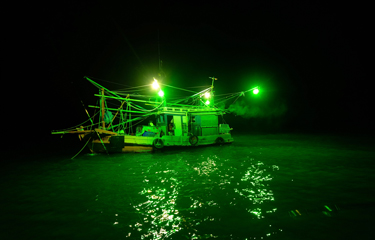A federal fine for a major fishing firm is further evidence China is increasing scrutiny of its huge distant-water fleet.
A court in southern China has fined Dalian Zhang Hai Distant Water Fishing Co for under-declaration of its international catcc, in a case that offers a rare glimpse into the offloading of catches at one of China’s leading fishery ports.
Dalian Zhang Hai Distant Water Fishing Co., which is based on Zhangzidao Island near Dalian city, the same area as leading seafood firm Zoneco, must pay a CNY 37,000 (USD 5,371, EUR 4,824) fine for neglecting to declare catches of ribbonfish, squid, and cuttlefish after a recent landing in Mawei port in southern China. Zhang Hai now has two weeks to pay the fine or risk seizure of its vessels.
Located on the outskirts of the city of Fuzhou, Mawai is home port for many Chinese fishing firms operating off the African coast. The port at Mawei is hugely important for China’s distant-water fleet, as its one of just three ports permitted by China’s national government to process international catches.
The high-profile coverage the case received from media across south China suggests the Chinese government desires to send message with the ruling. Anecdotal evidence over the years suggests many Chinese vessels have habitually under-reported catches to avoid tax – a tradition the government apparently is seeking to curb.
In a case of interesting timing, the fine was issued soon after the Chinese government revised a key law on distant-water fishing earlier this month, and after it introduced a new tracking system for all squid coming into its ports. The government has required that fishing companies must show certificates of origin for all landed squid showing it was caught legally, according to a document issued by China’s Ministry of Agriculture. The tracking system may help China to sign up to international Port States agreements that would require China to record data about the provenance of overseas catches – and bar access to vessels guilty or suspected of illegal activity.
In announcing the move, the ministry made reference to the need to “maintain responsible operations” as the leading squid fishing nation in the Southwest Atlantic and Southeast Pacific. China has faced international pressure over the past year after several of its vessels were caught fishing illegally, including high-profile incidents in Argentina and Ecuador.
However, China appears to be taking a mixed approach to its fisheries regulation, on the one hand showing increased willingness to crack down on unscrupulous operators while at the same time encouraging investment and growth in its fisheries sector. Regional government around China have sought to build up local fleets and processing hubs even as China’s central government has also joined the search for a deal with the WTO this year to limit fuel subsidies that allow otherwise unprofitable distant-water fishing firms to continue operating. Even as China commits itself to getting a deal done at the WTO on limiting subsidies to the distant-water fleet, it has also encouraged Chinese fishing firms to set up international bases – many of them ports in West Africa where boats are registered locally.
Among the largest Chinese squid-fishing firms operating in Africa is Penglai Jinglu Fishery Co Ltd, one of China’s major state-run fishing companies, which has extensive operations in Latin America fishing squid and tuna. Another state player is CNFC Overseas Fisheries, the listed arm of state-owned China National Fisheries Corp (CNFC), which recently added to its fleet with the takeover of Zhejiang Feng Hui Distant Water Fishing Co. And China’s banks have rolled in behind a major fishery trading hub which wants to be a world price-setter for squid. Zhoushan International Distant Water Base has secured CNY 600 million (USD 8.7 million, EUR 7.8 million) in a credit line from the Ocean and Agricultural Commerce Bank, a local lender owned by city and regional government.
As China’s demand for seafood continues to grow, government initiatives promoting increased scrutiny of its fleet will increasingly clash with China’s efforts to continue expanding its huge international fleet.
Photo courtesy of Full_chok/Shutterstock







